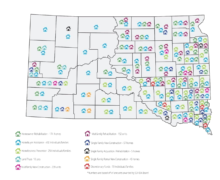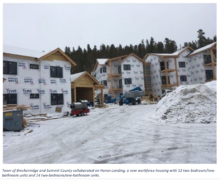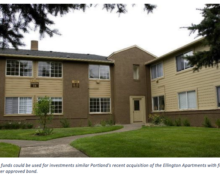Colorado Commits $45 Million Annually, Additional $30 Million to Housing Fund
by Michael Anderson // Spring
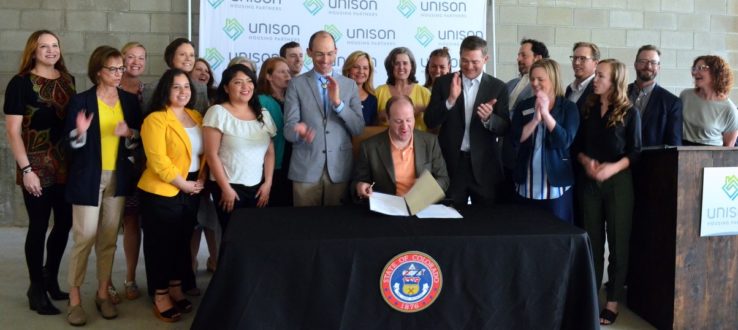
The Colorado Legislature passed a historic suite of legislation during the 2019 session intended to increase the availability of affordable homes: HB 19-1245 dedicates revenue from an existing vendor fee to the Housing Development Grant Fund; HB 19-1322 makes an upfront three-year “kick-start” investment to the same fund, HB 19-1228 expands the State Low-Income Housing Tax Credit, and HB 19-1319, which addresses barriers to the development of affordable homes. In total, the bills commit hundreds of millions in state funds to affordable housing preservation and production over the next 5 years, and on into the future.
“These investments in housing will be life-changing for communities and people across Colorado especially for those experiencing housing instability and homelessness,” said Cathy Alderman, Vice President of Communications and Public Policy for the Colorado Coalition for the Homeless (CCH). “We know what the solution to homelessness is – It’s housing and housing must be an investment made at all levels of government in partnership with the private sector, which is what this package of legislation accomplishes.”
HB 19-1245 provides Colorado with a robust source of dedicated funding for affordable housing, a long sought after goal of housing and homeless advocates throughout the state. The legislation adjusts an existing Colorado vendor fee and commits the revenue generated to the Division of Housing’s Housing Development Grant Fund to improve, preserve, or expand the supply of affordable housing in Colorado. This minor change in the way the allowance is administered will result in roughly $8 million being invested in housing across Colorado in 2019 and 2020, and then increase to $45-50 million per year thereafter. Thirty-three percent (33%) of the funds must be targeted at developments and programs targeted to households living at 30% area median income (AMI) and below which is where the largest housing shortages currently exist in Colorado. Housing Development Grant Fund provides funds through a competitive application process to improve, preserve or expand the supply of affordable housing.
HB 19-1322 provides a much needed upfront investment to the Division of Housing to provide funding for programs and projects that improve, preserve, or expand the supply of affordable low-income and workforce housing in Colorado. The bill appropriates $30 million of the unused funds in Colorado’s Unclaimed Property Trust Fund for three years with the first transfer at the end of FY2020-21. The funds would support grants and loans for the following purposes:
- Funding for the development, acquisition, and rehabilitation of affordable rental housing
- Homeownership in rural areas for income up to 120% of the area median income
- Homeownership throughout Colorado for income up to 80% of area median income
- Home modification and rehabilitation
- Mobile home repair and replacement
- Land and infrastructure costs to support affordable rental and/or ownership housing developments
- Rental assistance programs that benefit the following populations:
- Homeless families with children in school
- Medicaid clients in nursing homes who can live in their communities with in-home services
- Family unification and related programs that reduce intergenerational poverty
- Homeless or disabled veterans
- Households with annual income at or below 60% of the area median income
- Survivors of domestic violence
The tax credit expansion bill, HB 19-1228, raises the cap of total allowed state tax credits for the program from the current $5 million to $10 million. The bill to address barriers to development, HB 19-1319, institutes two policy changes: The bill requires an inventory of public lands suitable for the development of affordable homes and limits the “claw back” of property tax exemption fund for affordable housing projects in order to alleviate lenders’ concerns.
“This victory is a reflection of just how serious the housing challenges are in Colorado,” said Alderman. “We have had housing champions in the legislature and advocates across the state who have been calling for this type of investment for years. Their steadfast leadership and advocacy was key to galvanizing the rest of the legislature to take this historic action for affordable housing. Also key was the engagement of stakeholders from the private housing industry, nonprofit housing and service providers, health care and other constituencies that were committed to advancing a real funding solution to address the state’s housing needs.”
Housing Stakeholders Group
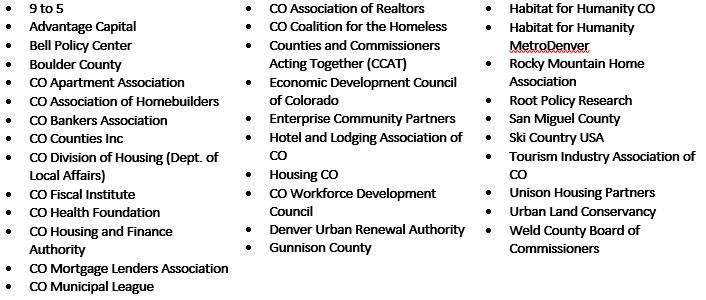
In addition to galvanizing the support of the stakeholders, a recent poll commissioned by CCH demonstrated strong support across the state for public investments in housing. The poll included 500 registered Colorado voters in which sixty percent of respondents indicated that there was a housing crisis in their community and sixty-eight percent believed that Colorado should have a dedicated funding source for housing.
For more information on the Housing Development Grant Fund, contact Wendy Hawthorne at the Division of Housing, 303-864-7838.


